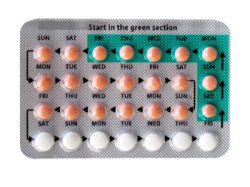 Advertisements for the birth control pill Yasmin flooded televisions when it was first introduced. You couldn’t even open a women’s magazine without finding a Yasmin ad inside. It was touted as just as effective as older, “third generation” forms of contraception but without the risks—and had the added bonus of good side effects such as clearer skin and lessened PMS.
Advertisements for the birth control pill Yasmin flooded televisions when it was first introduced. You couldn’t even open a women’s magazine without finding a Yasmin ad inside. It was touted as just as effective as older, “third generation” forms of contraception but without the risks—and had the added bonus of good side effects such as clearer skin and lessened PMS.
Technically a fourth-generation contraceptive, this is how Bayer got around the stringent testing that would otherwise be required of third-gen contraceptives.
Emilie Ponthieux filed her Yasmin lawsuit on Dec. 3, 2013 after she became yet another victim to suffer severe injuries caused by Yasmin blood clots. She was never told that the pill could cause deadly blood clots, and is lucky to have survived.
“Plaintiff was prescribed, purchased and ingested the prescription contraceptive medication products titled Yasmin and Ocella (hereinafter Ocella and/or Yaz/Yasmin /Ocella) and was diagnosed with a splenic infarct on or about May 25, 2010 as a proximate and direct result of using Yasmin and Ocella®, which were designed, developed, marketed, advertised and distributed by Defendants,” the Yasmin lawsuit states.
Splenic infarct is the death of tissue (necrosis) in the spleen due to a blockage in blood flow, which was allegedly caused by Yasmin blood clots.
Like many young women, she was drawn in to the promises of Yasmin. Who wouldn’t want a contraception that came with a bonus of clear skin and less cramps? However, the basis of Yasmin class action lawsuits is that Bayer knew about the risks, but chose not to warn about them. After all, Yaz was a very profitable drug. Birth control pills in general have a long history of causing blood clots.
“Shortly after the introduction of combined oral contraceptives in the 1960’s, doctors and researchers found that women using birth control pills had a higher risk of blood clots, heart attacks, and strokes than women not using the pill. As a result, the various brands of birth control pills were reformulated to reduce the amounts of estrogen. As the amounts of estrogen levels reduced, so too did the risk of blood clots, heart attacks, and strokes.” Yasmin, as it turns out, was no different.
“During the 1990’s, new ‘third generation’ progestins were developed. Unfortunately, these ‘third generation’ progestins (e.g. gestodene and desogestrel) have been associated with a greater risk of blood clots in the deep veins (deep vein thrombosis or “DVT”) and lungs (pulmonary embolism or ‘PE’). As a result of this increased risk of blood clots, the FDA has required that products containing third generation progestins include a warning of the potentially increased risk of thrombosis. Yaz® and Yasmin® contain the same estrogen component, ethinyl estradiol, that has been used in the lower dose birth control pills for decades.”
According to this Yasmin lawsuit, there was plenty of evidence and time on hand for Bayer to make the right moves. “During the brief time that Yaz/Yasmin/Ocella have been sold in the United States, hundreds of reports of injury and death have been submitted to the FDA in association with Defendants’ products. In April 2002, the British Medical Journal reported that the Dutch College of General Practitioners recommended that older second generation birth control pills be prescribed in lieu of Yasmin as a result of 40 cases of venous thrombosis among women taking Yasmin.”
Blood clots can be lethal if not caught and treated in time—but Yasmin patients never even knew what might be coming.
Taking Action
Recent studies have revealed shocking evidence about Yasmin blood clots, including one study which “found that Yaz/Yasmin/Ocella users have twice the risk of a clotting event than users of birth control pills that contain levonorgestral. Vandenbroucke, et al., The venous thrombotic risk of oral contraceptives, effects of estrogen dose and progestin type: results of the MEGA case-control study.”
There have been 50 deaths reported to the FDA from Yasmin blood clots, in just the few short years that it was available.
According to the Yasmin lawsuit, “Despite the wealth of scientific evidence, Defendants have not only ignored the increased risk of the development of the aforementioned injuries associated with the use of Yaz/Yasmin/Ocella, but they have, through their marketing and advertising campaigns, urged women to use Yaz/Yasmin/Ocella instead of birth control pills that present a safer alternative.”
She’s suing for defective manufacturing, design defect, defect due to inadequate warning, negligence, fraud, and breach of warranties.
The case is Emilie Nicole Ponthieux v. Bayer Healthcare Pharmaceuticals Inc. et al, MDL No.: 2100, in the United States District Court Southern District of Illinois.
Help for Yasmin/Yaz Blood Clot Victims
If you or a loved one took Yaz, Yasmin or another drospirenone birth control pill and were diagnosed with a venous blood clot injury such as deep vein thrombosis (DVT) or pulmonary embolism, you may be eligible to take legal action against the drug manufacturer. Filing a product liability lawsuit may help you obtain compensation for medical bills, pain and suffering and other damages. Learn more and obtain a free case evaluation at the Yaz, Yasmin, Beyaz & Ocella Birth Control Class Action Lawsuit Investigation.
ATTORNEY ADVERTISING
Top Class Actions is a Proud Member of the American Bar Association
LEGAL INFORMATION IS NOT LEGAL ADVICE
Top Class Actions Legal Statement
©2008 – 2025 Top Class Actions® LLC
Various Trademarks held by their respective owners
This website is not intended for viewing or usage by European Union citizens.














